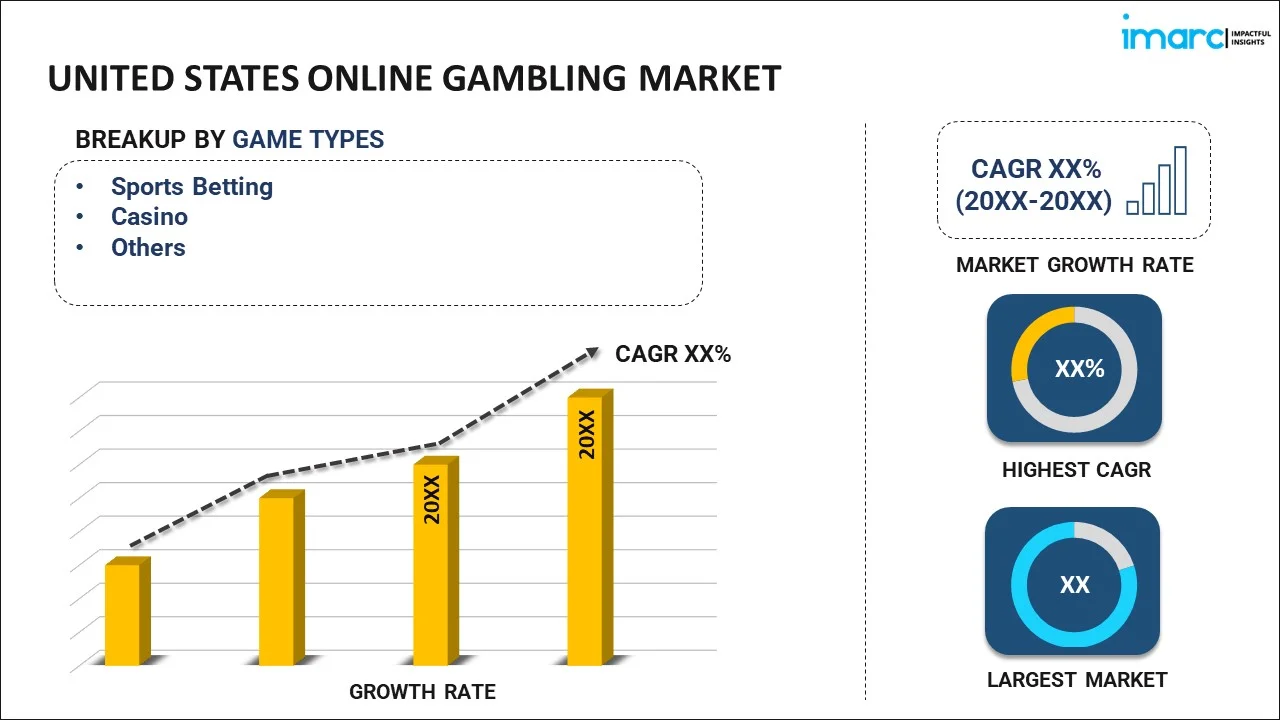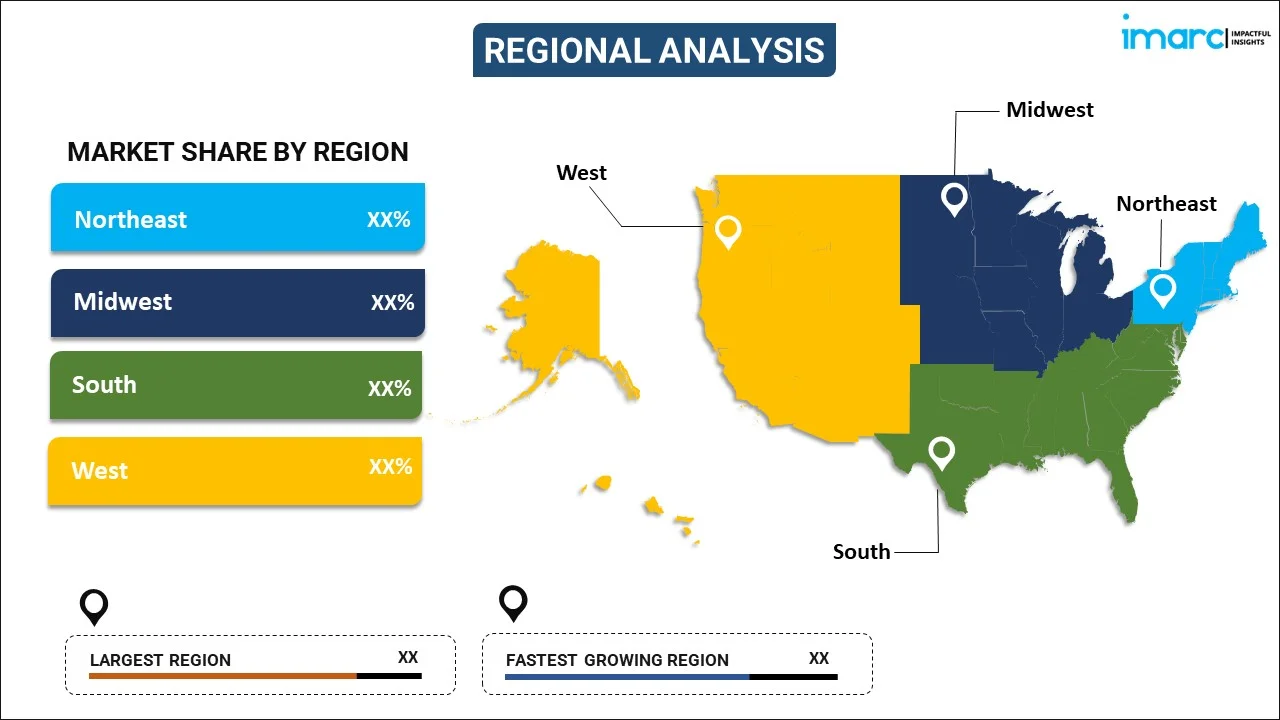
United States Online Gambling Market Report by Game Type (Sports Betting, Casino, and Others), Device (Desktop, Mobile, and Others), and Region 2026-2034
United States Online Gambling Market Forecast to 2026-2034:
The United States online gambling market size reached USD 11.8 Billion in 2025. The market is projected to reach USD 22.8 Billion by 2034, exhibiting a growth rate (CAGR) of 7.33% during 2026-2034. The market is driven by escalating state-level legalizations, developments in mobile technologies, and increasing consumer tolerance for digital betting sites. Improved user experience, safer transactions, and personalized content targeting are drawing a broader audience of players. Integration of cutting-edge technologies like AI, live dealers, and real-time analysis further drives engagement. With operators expanding to address increasing demand, these advancements all add to the increasing United States online gambling market share.
United States Online Gambling Market Insights:
- The growing integration of digital payment systems and secure platforms is enhancing trust and ease of transactions, encouraging more users to participate in online gambling across diverse gaming categories.
- Advancements in mobile technology and widespread smartphone usage are transforming user experiences, making online gambling more accessible and engaging, particularly among younger demographics seeking convenience and entertainment.
- Legalization trends across multiple U.S. states are creating a supportive regulatory environment, prompting operators to expand offerings while ensuring compliance with responsible gaming and consumer protection standards.
- Strategic partnerships between media companies and online betting platforms are strengthening brand visibility, driving user acquisition through promotional content, integrated apps, and cross-platform advertising.
- Innovations in live dealer games, virtual sports, and AI-driven personalization are enriching the gaming experience, fostering higher retention and attracting a wider user base across competitive entertainment platforms.
|
Report Attribute
|
Key Statistics
|
|---|---|
|
Base Year
|
2025
|
|
Forecast Years
|
2026-2034
|
|
Historical Years
|
2020-2025
|
| Market Size in 2025 | USD 11.8 Billion |
| Market Forecast in 2034 | USD 22.8 Billion |
| Market Growth Rate 2026-2034 | 7.33% |
Access the full market insights report Request Sample
Also known as virtual gambling, online gambling refers to betting on sports-based activities or casinos over the internet. It does not require a physical interaction of players and the sessions are conducted online via computer programs. Consequently, games such as blackjack, roulette, sports betting, slot machines and poker are gaining traction in the United States.
The key market players operating in the United States are focusing on mergers and acquisitions to expand their overall reach. These players are also launching their offerings in the potential market, which is bolstering the market growth. Besides this, the increasing utilization of electronic devices like smartphones and laptops are strengthening the growth of the market across the country. Furthermore, the outbreak of the coronavirus disease (COVID-19) has positively influenced the growth of the online gambling industry as the imposition of lockdown restrictions have surged the number of visitors to the casino and gambling websites. This, in confluence with the advent of bitcoin gambling, is anticipated to fuel the market growth in the country.
United States Online Gambling Market Trends:
Legalization and Expanding Regulation State by State
The U.S. online gambling industry is being defined by the incremental growth of legalized online gaming and betting state by state. Each state has a right to oversee online gambling, and this has created a quilted system of regulation that differs by state. This regulatory environment is increasingly complex as additional states author or edit legislation to reap tax revenue, protect consumers, and implement sound gaming practices. Legalization accelerates based upon political will, political opinion, and the success of pioneer states. As more jurisdictions adopt regulated online gaming, operators are converging offerings to meet local regulatory requirements, driving growth in localized sites and bespoke digital experiences. As per the sources, in June 2025, Jumbo88 Casino opened up in the USA with a sign-up offer of 10,000 Gold Coins and 1 Sweepstakes Coin, making its way into the sweepstakes gaming industry. Moreover, this momentum not only encourages market expansion but also fuels innovation and alliances that adapt to varied regulatory regimes while enhancing the legitimacy and mainstream acceptability of online gaming as a regulated leisure channel.
Emergence of Mobile Gaming and User Experience Solutions
Mobile access is a leading force of the United States online gaming market, with most users now accessing through tablets and smartphones. Sites are becoming more optimized for mobile-first usage, with features including easy navigation, in-play wagering, and quick-loading games. This change has also impacted online casino and sportsbook design, with firms spending on user-friendly features like in-app assistance, biometric authentication, and push notifications. According to the sources, in May 2025, the US online gambling scene witnessed significant developments as new casinos geared towards launching into the market. Betr Casino, Mr. Vegas Casino, and Hollywood Casino hinted at impending launches, signaling consistent growth in the industry in the wake of continued regulatory restraints across states. Furthermore, the increasing complexity of mobile applications has increased the ease and interactivity of online gaming, resulting in greater user engagement. Increased digital payment integration and protected transaction processing also add to enhanced user experience. With customers demanding speed, convenience, and personalization, the emphasis on mobile usability and interface innovation remains stronger than ever. These innovations are not only revolutionizing player expectations but also setting new standards for digital entertainment in controlled gambling settings.
Technology and Player Engagement Features
Technology is playing its transformative part in shaping the future of the United States online gambling sector. Artificial intelligence, machine learning, and predictive analytics are being employed to develop personalized gaming, optimize risk management, and track responsible gambling practice. Platforms are incorporating gamification features like loyalty schemes, leaderboards, and achievement badges to keep players engaged and coming back regularly. Live dealer games and virtual reality-based settings are also becoming popular, offering engaging experiences that mirror land-based casino environments. Real-time data analytics facilitate dynamic odds and tailored marketing, further optimizing engagement. While this is taking place, cybersecurity developments are also guaranteeing player data protection and gaming operation integrity. Using blockchain for transparency and fairness, while still nascent, is another indicator of the trend of incorporating state-of-the-art technologies. These technologies are paving the way for the future of online gambling by coupling entertainment with data-driven engagement techniques.
United States Online Gambling Market Growth Driver:
One of the most important drivers of United States online gambling growth is the rising legalization of online gambling in various states. As each additional jurisdiction sees the economic potential—especially the tax dollars and employment opportunities—the regulatory frameworks have progressively expanded to include and manage online gambling. This new legislation creates new markets for operators and stimulates innovation in platform creation, payment, and user experience. At the same time, the rapid development of mobile and digital technologies has increased convenience and accessibility of gambling, particularly among younger, technologically oriented audiences. High levels of internet penetration and widespread smartphone penetration enable customers to bet instantly, play casino games, and play fantasy sports with ease. Additionally, the proliferation of online entertainment, combined with focused marketing and enhanced security features, has diminished the stigma surrounding Internet gambling. Combined, these drivers are facilitating the industry to expand quickly while drawing a wide and diverse clientele.
Key Market Segmentation:
IMARC Group provides an analysis of the key trends in each sub-segment of the United States online gambling market report, along with forecasts at the country and regional level from 2026-2034. Our report has categorized the market based on game type and device.
Breakup by Game Type:

To get detailed segment analysis of this market Request Sample
- Sports Betting
- Football
- Horse Racing
- E-Sports
- Others
- Casino
- Live Casino
- Baccarat
- Blackjack
- Poker
- Slots
- Others
- Others
Breakup by Device:
- Desktop
- Mobile
- Others
Breakup by Region:

To get detailed regional analysis of this market Request Sample
- Northeast
- Midwest
- South
- West
Competitive Landscape:
The competitive landscape of the industry has also been examined along with the profiles of the key players.
Latest News and Developments:
- In June 2025, Kintex Ventures LLC debuted Sixty6 Casino, another player in the U.S. sweepstakes gambling industry. With more than 500 classic and new slot titles available, Sixty6 welcomes players with 75,000 Gold Coins and 2 Sweeps Coins as a sign-up bonus, hoping to entice newbies with daily rewards and active promotions.
- In May 2025, Fanatics rolled out a stand-alone online casino app in four states in the U.S., its deeper foray into the gambling industry. Using its 100-million user base and loyalty program, the company positions itself as a serious threat to DraftKings and FanDuel in the crowded online casino space.
Report Coverage:
| Report Features | Details |
|---|---|
| Base Year of the Analysis | 2025 |
| Historical Period | 2020-2025 |
| Forecast Period | 2026-2034 |
| Units | Billion USD |
| Segment Coverage | Game Type, Device, Region |
| Region Covered | Northeast, Midwest, South, West |
| Customization Scope | 10% Free Customization |
| Post-Sale Analyst Support | 10-12 Weeks |
| Delivery Format | PDF and Excel through Email (We can also provide the editable version of the report in PPT/Word format on special request) |
Key Questions Answered in This Report
The United States online gambling market was valued at USD 11.8 Billion in 2025.
We expect the United States online gambling market to exhibit a CAGR of 7.33% during 2026-2034.
The rising penetration of IoT-based devices, along with the growing adoption for online gambling as it offers cashless transactions, accessibility through electronic devices, customizable budgets, etc., is primarily driving the United States online gambling market.
The sudden outbreak of the COVID-19 pandemic has led to the changing consumer inclination from brick-and-mortar casinos towards online gambling activities, owing to the implementation of stringent lockdown regulations across the nation.
Based on the game type, the United States online gambling market has been segmented into sports betting, casino, and others. Among these, sports betting currently exhibits a clear dominance in the market.
Based on the device, the United States online gambling market can be divided into desktop, mobile, and others. Currently, desktop holds the majority of the total market share.
On a regional level, the market has been classified into Northeast, Midwest, South, and West.
Need more help?
- Speak to our experienced analysts for insights on the current market scenarios.
- Include additional segments and countries to customize the report as per your requirement.
- Gain an unparalleled competitive advantage in your domain by understanding how to utilize the report and positively impacting your operations and revenue.
- For further assistance, please connect with our analysts.
 Request Customization
Request Customization
 Speak to an Analyst
Speak to an Analyst
 Request Brochure
Request Brochure
 Inquire Before Buying
Inquire Before Buying




.webp)




.webp)












